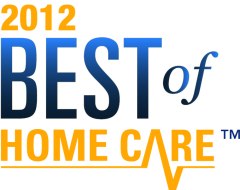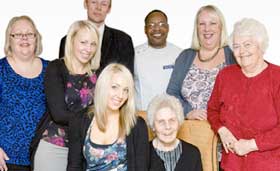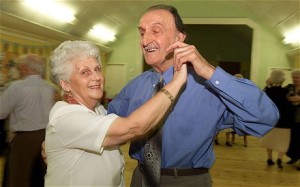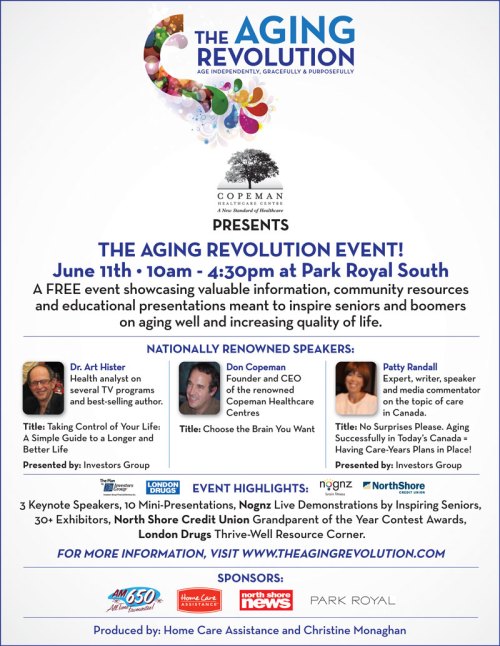 In March 2012, Homecare Assistance Vancouver received a Best of Home Care award from Home Care Pulse, recognizing the company–out of 300 companies–for its outstanding ability to provide quality service to its clients. In addition, the award mentions Homecare Assistance Vancouver’s exceptional communication with clients and the timeliness and concise scheduling of its caregivers.
In March 2012, Homecare Assistance Vancouver received a Best of Home Care award from Home Care Pulse, recognizing the company–out of 300 companies–for its outstanding ability to provide quality service to its clients. In addition, the award mentions Homecare Assistance Vancouver’s exceptional communication with clients and the timeliness and concise scheduling of its caregivers.
We’re overjoyed at this tremendous honor and ecstatic that 2012 is continuing on such a great note! Many, many thanks go out to our staff, caregivers, and clients who all had a hand in making us the award-winning company we are today!
PRESS RELEASE
Homecare Assistance Vancouver Receives “Best of Home Care” Award
(VANCOUVER – March 20, 2012) – Homecare Assistance Vancouver today announced that it has been recognized with Home Care Pulse’s “Best of Home Care” distinction. Awarded to the top 25% of agencies in client and employee satisfaction scores from Home Care Pulse, Homecare Assistance Vancouver is now ranked among a select few of the best agencies in the country.
“We know that sometimes it is difficult to make care decisions when you don’t have specific experience with an agency. It was our goal to provide families with the ability to make an informed decision, have tangible ways to measure quality and help them find a comfort level when choosing an agency to work with,” commented Aaron Marcum, founder of Home Care Pulse.
Home Care Pulse, a company which measures client and employee satisfaction, created the award to identify those agencies in the private duty home care space that demonstrated a passion for client and employee satisfaction. Home Care Pulse believes that honoring such companies can both educate and help families to make better care decisions for their aging loved ones.
“We are very honored to have received this award in less than two years of operations,” says Carolina Orosa, President of Home Care Assistance Vancouver. “It’s very fulfilling knowing that our clients recognize all our efforts in providing the highest quality of care possible and that these efforts have helped them continue to lead independent, purposeful lives.”
The selection process for the “Best of Home Care” includes the evaluation of client and employee satisfaction in areas such as agency training, communication, overall quality of care, caregiver performance, caregiver morale, response to problems and recommendation of services to name a few.
“We want to congratulate Homecare Assistance Vancouver for winning the “Best of Home Care” award and commend their commitment to placing high priority on client and employee satisfaction,” concluded Marcum.
To find out more about the “Best of Home Care” award or Home Care Pulse, please visit www.bestofhomecare.com.
About Home Care Pulse
Home Care Pulse was launched in 2008 and is a company specializing in measuring and benchmarking client and employee satisfaction for private duty home care agencies. Recently Home Care Pulse conducted the largest study ever performed on behalf of the private duty industry. Home Care Pulse helps agencies promote and drive business, improve service quality and increase employee loyalty. Visit http://www.homecarepulse.com for more information.
About Homecare Assistance Vancouver
Homecare Assistance Vancouver provides highly specialized hourly and live-in caregivers to the elderly to assist in all the activities of daily living including housekeeping, meal preparation, transportation, medication reminders, bathing, and grooming. We also specialize in Alzheimers, Dementia and Parkinsons care, palliative and orthopedic care as well as cancer recovery. All our caregivers are thoroughly screened prior to employment and are given extensive training in the company’s exclusive Balanced Care Method™, which is designed to promote total health and maximum independence for seniors. Further information can be found on our website: www.homecareassistance.com.









